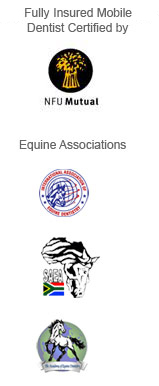Selecting an equine dentist
1. REFERENCES/ REPUTATION (For Excellence)
Word of mouth is the best form of reference. When selecting an equine dental professional talk to people who ride professionally at an advanced level or to someone you feel has extensive knowledge of equine husbandry. Talk to them about not only their current dental professional and about whom they have used in the past, but also whether they felt they were thorough and effective. Did your horse eat normally soon after the dentistry? While major work may alter the horse's eating patterns for a few days, there should not be a prolonged period where the horse does not eat. For routine follow up work, there should not be unexplained tissue damage.
2. CERTIFICATION/ EDUCATION/ EXPERIENCE
Preferably practitioners (both veterinarians and non-veterinarians) should have specialist education in equine dentistry. Be this formal school instruction, an apprenticeship or continued education in equine dentistry. Preferably they should regularly engage in professional improvement and be certified. Experience is important, however experience in performing high quality, advanced work may out weigh years of mediocre work.
3. OBSERVE WORK
One may want to arrange to watch the professional work at another yard. This will allow you to judge presentation, equipment and technique. Answer these questions while observing. Are they clean and antiseptic? Do they show compassion for your horse? Do they chart the horse's mouth? Do they explain their work? Do they use a good light and speculum? Can you see the mouth before and after? Does this person do thorough and effective work?
4. KNOWLEDGE ON THE EFFECTS OF THE HORSE'S DENTITION ON BOTH EATING AND RIDING.
When you talk to your dental professional about your horse's problems, do they seem to have a deep knowledge of the horse's mouth and problems related to dental issues? This may vary from proper diets to specific riding problems. For those aiming to solve riding problems resulting from dental issues, using a dental professional with riding experience may be advantageous.
5. PROFESSIONALISM
Does this individual have an air of professionalism about them? Do you feel they will be responsive to you and your horse's needs? Will they be reliable? Will they return your calls? Can you trust them with such an integral part of your horse's care?.
6. GEOGRAPHIC AREA/ AVAILABILITY
While selecting your professional, you may want to consider their availability. Do they live or work regularly in your area? If they do not, does this suit your situation? Do you get new horses regularly or do you have the same ones all the time and therefore may not need a dental professional more than twice per year.
7. SCOPE OF WORK
When evaluating the dental professional, you may want to consider the level of their work. Do they perform procedures such as incisor realignments, molar extractions and molar overgrowth reductions where appropriate or do they quite simply float off sharp edges? Do they aim to balance and rehabilitate the dentition where necessary or to simply stop the horse from cutting their cheeks with sharp edges? This will directly impact the results you get from the dentistry. It will impact the horses riding and eating and the longevity of the dentition.
8. PROCEDURES/ METHODS
At the moment, there are numerous tools and pieces of equipment, which can be used to perform quality equine dentistry. There is constant ongoing discussion between equine dental professionals and the public about the "best" ways to achieve desired results. The quality of the work is more important than the particular tools used. However, some of the new power tools are more effective in specific instances if used by trained, educated professionals. One must satisfy oneself of the professional's proficiency with their tools. Good tools in good hands achieve good results.
Anyone who has worked with a horse knows their power, especially when afraid or intimidated. Please be aware, to effectively perform equine dentistry many horses need to be sedated. This has become common practice in many equine dental practices. Safely administered, these drugs can make the difference between good, effective work and mediocre work. Please do the right thing for your horse and your equine dental professional by and arranging for sedation for your horse where your dental professional feels it is appropriate.
SUMMARY
There are many things to consider while selecting an equine dental professional. Hopefully the above points will help you select someone who is capable of providing excellent equine dental care. If you have difficulty finding someone in your area, please phone or email me

